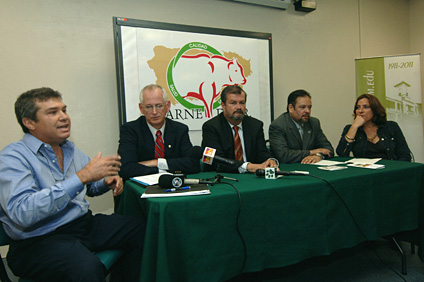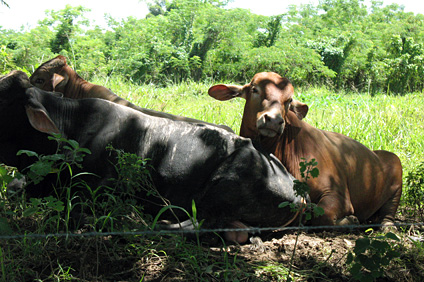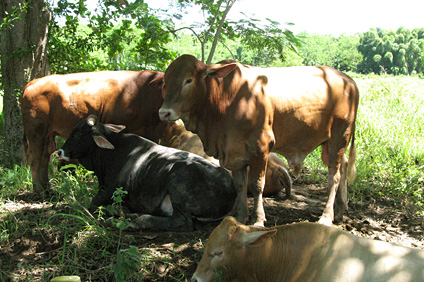|
|
|
Friday, October 10th 2008 [ versión español ]
The College of Agricultural Sciences (CCA by its Spanish acronym) of the University of Puerto Rico at Mayagüez (UPRM), the Puerto Rican Agricultural Department, and the Fund for the Promotion of the Beef Industry (designed by Island Cattleman) will begin an educational campaign, with the intention of informing consumers about the benefits of homegrown Puerto Rican Beef for local consumers.
UPRM chancellor, doctor Jorge Iván Vélez Arocho; Dean of the College of Agricultural Sciences, doctor John Fernández Van Cleve; and Secretary of the Agricultural Department, agronomist, Gabriel Figueroa Herrera, announced the campaign at a conference held at UPRM. The Executive Director of the Fund for the Promotion of the Beef Industry, agronomist Laura Chambers also participated in the announcement.
The purpose of the campaign, as officials explained it, is for the consumer to buy Puerto Rican Beef instead of imported beef. “We have united forces with the Department of Agriculture through the program, Extension of Agricultural Services supplied to UPRM’s College of Agricultural Sciences, to reveal the quality of the beef that is produced in Puerto Rico, and by buying homegrown beef, we will be contributing to the country’s economic development,” stated UPRM Chancellor.
Dean of Agricultural Sciences and Director of SEA, Fernández Van Cleve, explained that, “it is a scientifically proven fact that Puerto Rican Beef is healthier than imported beef.”
Secretary of the Agricultural Department, Figueroa Herrera, a graduate of UPRM, mentioned that freshness is an important quality of homegrown beef.
“In just three days, the consumer is able to enjoy fresh cut meat of superior quality, while imported can be delayed weeks before it even becomes available to the Puerto Rican Consumer. Some other advantages are low fat content attributed to the livestock’s diet, also due to the elimination of the use of growth hormones or antibiotics to prime the livestock,” reported Figueroa.
Results about the quality of Puerto Rican Beef were produced in a study done by doctor Américo Casas, investigator of livestock, and of CCA beef. With respect to the fat content in homegrown beef, on average, Puerto Rican beef contains 50 percent less than that of imported beef. The same investigation noted that the amount of cholesterol in homegrown beef is lower as well.
“We also know that the content of OMEGA-3 fatty acids is much higher in our beef. Omega-3 fatty acids are associated with better health. Our beef has numerous nutritional factors working in its favor,” assured Casas.
According to professor Luis Mejía Maymí, Auxiliary Dean of the College of Agricultural Science’s Educational Program and project manager, in actuality, Puerto Rico produces 15 percent of the beef consumed on the Island, the project’s goal is to raise that number to 25 percent. “It should be clear that the purpose isn’t to raise the amount of beef consumed per capita, just to substitute Puerto Rican beef for the imported,” clarified Mejía Maymí. The professor added that the augmentation of the consumption of homegrown beef would also increase the income of Puerto Rican farmers close to $23 million dollars.
The campaign will be subsidized by the amount of $63 thousand dollars provided by the Department of Agriculture and the Fund for the Promotion of the Beef Industry. The campaign will educate farmers about reproduction, nutrition, and herd management in general, to help beef production to be more efficient. The campaign will be done by means of two computerized programs that will work with farms records of production, and economic records.
Meanwhile, in regards to the consumers, the campaign will utilize a guide that contains six lessons, which will familiarize them with the benefits of Puerto Rican beef. This will be done through educational initiatives such as radio programs, informative meetings, pamphlets, and displays to name a few, those of which will be carried out by agricultural agents from 65 of the UPRM SEA offices, with locations throughout the Island.
Video
Verify that your navegator can ejecutate javascript and that has the most recent version of Adobe Flash Player. Dowmload Flash Player

In order from left to right: Professor Luis Mejía, Dean John Fernández Van Cleve, Chancellor Jorge Iván Vélez Arocho, Secretary Gabriel Figueroa Herrera and Agronomist Laura Chambers.

Dr. Américo Casas explains the results of a study done on beef.

The campaign will be used to educate livestock owners on reproduction, nutrition, and herd management in general.

The study shows the fat content in Puerto Rican beef is 50% less, on average, than imported beef.
Photographs by Carlos Díaz and Mariam Ludim Rosa / UPRM Press
|

